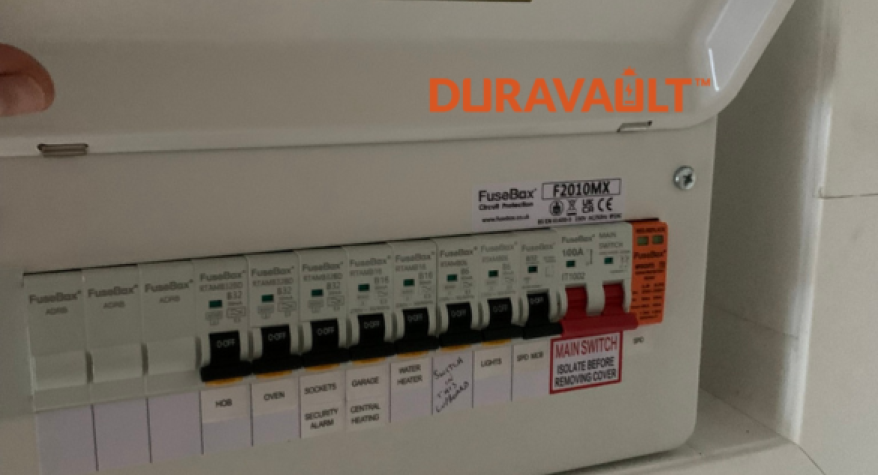Electricity powers almost every aspect of modern life — from lighting and heating to cooking and charging devices. But while it’s essential, electricity can also be extremely dangerous when not treated with care.
10 Electrical Safety Tips Every Homeowner Should Know
In fact, faulty electrics cause over 20,000 accidental fires in UK homes each year, many of which could be prevented with proper safety precautions. Electricity powers almost every aspect of modern life — from lighting and heating to cooking and charging devices. But while it’s essential, electricity can also be extremely dangerous when not treated with care. In fact, faulty electrics cause over 20,000 accidental fires in UK homes each year, many of which could be prevented with proper safety precautions.
As a homeowner, taking electrical safety seriously is one of the best ways to protect your family, your property, and your peace of mind.
In this guide, the experts at Duravault, NICEIC-approved electricians, share 10 essential electrical safety tips that every homeowner should know and follow.
1. Don’t Overload Plug Sockets
Plugging too many appliances into a single socket or extension lead is one of the most common causes of electrical fires. Each socket is designed to handle a certain load, and overloading can cause overheating. Tip: Use a high-quality extension lead with surge protection if you need more outlets, but avoid “daisy chaining” multiple adaptors together.
2. Test Your RCDs Regularly
A Residual Current Device (RCD) is designed to cut off electricity instantly if a fault is detected, preventing electrocution and fire. But like any safety device, it needs testing to ensure it works properly. Tip: Press the “test” button on your RCDs every three months. If they don’t trip, call a qualified electrician immediately. Check out our https://www.duravault.co.uk/service/fuseboard-upgrades page for more information
3. Watch Out for Signs of Electrical Problems
Small warning signs can point to bigger issues. These include:
- Flickering or dimming lights
- Burning smells from sockets or appliances
- Warm or discoloured plug sockets
- Buzzing noises from switches
Tip: If you notice any of these signs, stop using the outlet and book an inspection with a professional electrician.
4. Keep Water Away from Electrics
Water and electricity are a dangerous combination. Bathrooms, kitchens, and outdoor areas pose a higher risk of electric shock. Tip: Never use electrical appliances near sinks or baths. Always install weatherproof sockets outdoors and ensure bathroom electrics are installed by a qualified professional.
5. Replace Damaged Cables and Appliances
Frayed, cracked, or exposed cables can easily cause shocks or fires. Old or damaged appliances are another common risk. Tip: Check cables and plugs regularly. If you see damage, replace the appliance or have the cable repaired by an electrician.
6. Invest in an EICR (Electrical Installation Condition Report)
Even if your home “seems fine,” hidden electrical issues can pose serious risks. An EICR checks the condition of your home’s wiring, sockets, switches, and consumer unit to ensure everything is safe and compliant.
Tip: Homeowners should book an EICR every 10 years (or sooner if recommended). For landlords, it’s legally required every 5 years. Check out our https://www.duravault.co.uk/service/eicr for more information
7. Don’t Attempt DIY Electrical Work
Changing a lightbulb is fine — but rewiring sockets, adding circuits, or replacing a consumer unit is not. DIY electrical work is not only dangerous but can also invalidate insurance policies if something goes wrong. Tip: Always hire a NICEIC-approved electrician for any electrical installations or repairs.
Here you can see the dangers of carrying out DIY electrical work in your home https://www.duravault.co.uk/blog/hidden-costs-diy-electrical-work
8. Be Careful with Extension Leads
Extension leads are handy but often misused. Overloading them or running them under carpets can cause overheating. Tip: Use extension leads only as a temporary solution. For long-term needs, ask an electrician to install additional sockets.
9. Install Smoke Alarms and Test Them Regularly
Electrical faults are a leading cause of house fires — but smoke alarms provide an early warning that can save lives. Tip: Fit smoke alarms on every floor of your home, test them monthly, and replace batteries annually (unless sealed).
10. Call a Professional When in Doubt
Electrical safety is not something to take chances with. If you’re unsure about an electrical issue, it’s always safer (and cheaper in the long run) to call a professional. Tip: Keep the contact details of a trusted electrician, like Duravault, handy for emergencies and routine maintenance.
Bonus Tip: Upgrade to LED Lighting
Not only are LEDs energy-efficient, but they also generate less heat than traditional bulbs, reducing fire risk and lasting far longer. A small change, but a smart safety upgrade. Have a look at our LED downlights page - https://www.duravault.co.uk/service/led-downlights
How Duravault Keeps Homes Safe
At Duravault, we’re passionate about helping homeowners keep their properties safe and compliant. Our services include:
- Consumer unit upgrades with RCD protection
- Rewiring and fault finding
- Smoke alarm installation
- Expert advice on safe, efficient home electrics
With NICEIC-approved electricians and years of experience, we’re trusted by homeowners across [your service area] to deliver safety and peace of mind.
Conclusion
Electrical safety doesn’t have to be complicated — small habits and regular checks make all the difference. By following these 10 essential tips, you’ll reduce the risk of shocks, fires, and costly damage while keeping your home and family safe.
Contact Duravault today to book a professional electrical safety inspection and protect your home with complete peace of mind.



